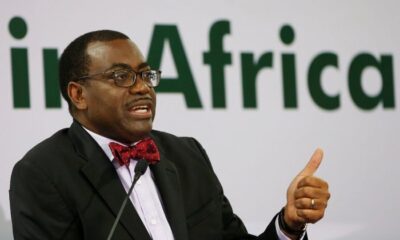Markets
Fitch’s Bank Rating, a Reflection of Current Economic Realities
Published
8 years agoon

- Fitch’s Bank Rating, a Reflection of Current Economic Realities
Olaseni Durojaiye, in this report, reviews the recent Fitch Ratings’ assessment of Nigerian banks and presents the perspectives that the rating mirrors the current economic realities.
Barely a month after some Nigerian banks came under the spotlight via the Moody’s rating, the sector is again back under the klieg lights as a leading global rating agency, Fitch Ratings, published its Sovereign Support Rating Floors of 19 Nigerian banks. This followed a reassessment of potential sovereign support for the lenders.
The cause, according to analysts is traced to the scarcity of the United States Dollar (USD) and depleted external reserves, which already constrain government from playing its supporting roles when banks face such tough times.
While the recent rating should not come as a surprise to analysts and observers of happenings in the economy, considering that financial institutions outlook in emerging markets revealed negative trends, it nevertheless reiterates the current economic challenges in the country’s economy.
The Fitch Ratings
Fitch Ratings publishes opinions on a variety of scales. The most common of these are credit rating, but the agency also publishes ratings, scores and other relative opinions relating to financial or operational strength. For example, Fitch Ratings also provides specialised ratings of servicers of residential and commercial mortgages, asset managers and funds.
Fitch Ratings’ credit rating provide an opinion on the relative ability of an entity to meet financial commitments, such as interest, preferred dividends, and repayment of principal, insurance claims or counterpart obligations. Credit rating is used by investors as indications of the likelihood of receiving the money owed to them in accordance with the terms on which they invested. The agency’s credit rating covers the global spectrum of corporate, sovereign (including supranational and sub-national), financial, bank, insurance, municipal and other public finance entities and the securities or other obligations they issue, as well as structured finance securities backed by receivables or other financial assets.
The Recent Rating
In its revision of the rating of 19 Nigerian banks, Fitch Ratings downgraded the long term issuer Default Ratings of First Bank of Nigeria Limited, FBN Holdings Plc, Diamond Bank Plc, Fidelity Bank Plc, First City Monument Bank Limited and Union Bank of Nigeria Plc from ‘B’ to ‘B-‘in line with their stand-alone credit worthiness as defined by their Viability Rating.
In the same rating, the agency affirmed the long-term IDRs of Zenith Bank Plc, Guaranty Trust Bank Plc, United Bank for Africa Plc, Wema Bank Plc and Bank of Industry.
According to a statement released in London, the agency explained that, “The downgrade of nine banks’ SR and revision of 10 banks’ SRFs to ‘No Floor’ reflects Fitch’s view that senior creditors can no longer rely on receiving full and timely extraordinary support from the Nigerian sovereign if any of the banks become non-viable.
“Fitch believes that the Nigerian authorities retain a willingness to support the banks, but their ability to do so in foreign currency is weakening due to Nigeria’s eroding foreign currency/reserves, as well as limited confidence that any available foreign will not be used to execute other policy objectives. Therefore, Fitch takes the view that supports, if ever required by the banks, cannot be relied upon”.
According to Fitch, the long-term IDR of Diamond Bank Plc, Fidelity Bank Plc, FCMB and Union Bank are downgraded to ‘B-‘ as they are now underpinned by their VRs of ‘B-’ rather than their SRFs, as was previously the case.
The Fitch Ratings statement added that, “The downgrade of FBN’s long-term IDR reflects both revision of its SRF and a downgrade of its VR. The latter reflects Fitch’s view that the bank’s capital base is no longer commensurate with its risk profile, reflecting questions about asset quality, particularly its level of unreserved impaired loans to Fitch Core Capital (54 per cent as at the end of 2016) and pressure on its regulatory capital adequacy ratio.
“The VR of FBNH has also been downgraded, which drives the downgrade of its long-term IDR to ‘B-’.
Fitch also noted that it had also downgraded the national long-term ratings of Diamond Bank, Fidelity Bank, FCMB and Union Bank to ‘BBB (nga)’ from ‘BBB+’ (nga) following the rating actions on their long-term IDRs.
Analysts’ Opinions
Reacting to the rating, Executive Director, Corporate Finance, BGL Securities, Olufemi Ademola, said in an interview that the rating was not abstract but reacting to a bad situation.
According to him, “The rating is nothing abstract; it is reacting to a bad situation that the banks find themselves. It’s not surprising to discerning observers because the problem cuts across all sectors, be it oil and gas, power or sales (fast-moving consumer goods).
“With the likelihood of another round of devaluation of the naira, banks with high USD denominated loans are in trouble because what the situation translates to is that their liability has doubled. This has weakened their balance sheet. GTBank was smart to have paid off their Euro bond in advance before it matured,” he stated.
Ademola contended that lending at this time would attract higher interest due to the perceived higher risks involved adding that since there is the likelihood of another round of devaluation of the naira, the banks are weaker than they were before.
“The banks are weaker than they were before and there is the tendency of a further devaluation of the naira. Lending at this time will attract a higher interest because of the perceived higher risk involved as some will (have) high concern around ability to repay,” he submitted.
On his part, a Lagos-based analyst with a foremost economic advocacy group, Rotimi Oyelere, argued that the rating did not connote insolvency or banking industry stress but a pointer that the industry might be defaulting in meeting obligations to foreign investors as well as paying for maturing bills. He views it as an assessment of the banks’ status with respect to their abilities to attract foreign capital and meet their foreign obligations.
According to him, this is as a result of the scarcity of the greenback, depleted external reserves, which already constrain government from playing its supporting roles when banks face such tough times.
“It thus raises the question as per the quality of the assets of the banks. It appears toxic assets, non-performing loans (NPLs) and other highly risky investment are once again gathering momentum. I think the banks failed to build substantial buffers especially in assets denominated in foreign currency in the era of plenty. This would have shielded them from the current pervasive volatility. With possibility of further depreciation of the naira, the banks’ buffers may suffer further attacks.
“Another contributory factor to the asset quality generally is the number of high valued loans/facilities that have been restructured, particularly in the oil and gas sector. This is why it is important for the banks to apply appropriate metrics when pricing their risks especially in times of boom,” he said.
Speaking further, Oyelere stated that, “In times like this, the apex bank must raise its games to minimise regulatory risks, or perhaps contractions in the industry.
“Banks may explore the bonds market for raising fresh capital to finance maturing bills. Access Bank successfully raised about $350 million some months back,” he argued, adding that, “The viable bailout for the banks and even for the economy in the short term is restoration of peace in the Niger Delta region, if it will restore output to budget benchmark of 2.2 million barrel per day and then more foreign flows to the national account. If we can at least produce good quantity consistently, some of these currency depreciation risks would be averted,” he maintained.
Is the CEO and Founder of Investors King Limited. He is a seasoned foreign exchange research analyst and a published author on Yahoo Finance, Business Insider, Nasdaq, Entrepreneur.com, Investorplace, and other prominent platforms. With over two decades of experience in global financial markets, Olukoya is well-recognized in the industry.

You may like
-
Nigeria Joins BRICS as Partner Country, Strengthening Global South Cooperation
-
70 Million Poorest of The Poor Nigerians To Get N75,000 From FG
-
Nigeria Surpasses OPEC Quota with 1.51 Million bpd, Targets 2.06 Million in 2025
-
Global Investors Commit $7.6 Billion to Nigeria’s Development at AIF 2024
-
Nigeria-China Trade Strengthened as Grimaldi Introduces Direct Shipping Line
-
Nigeria’s GDP Records 3.46% Growth in Q3 Spurred by Non-Oil Sector













